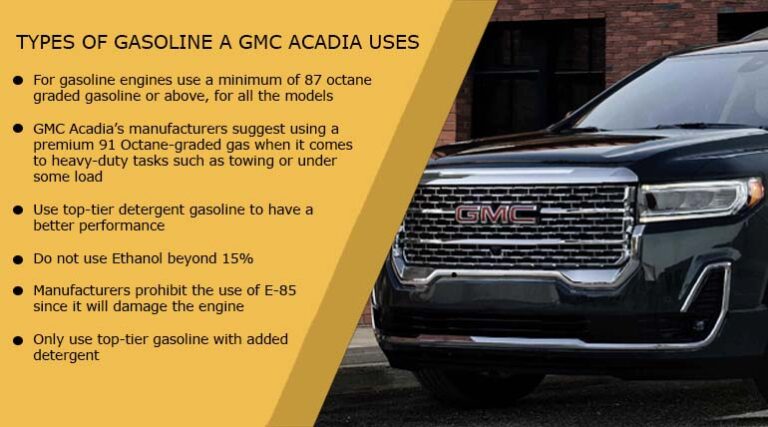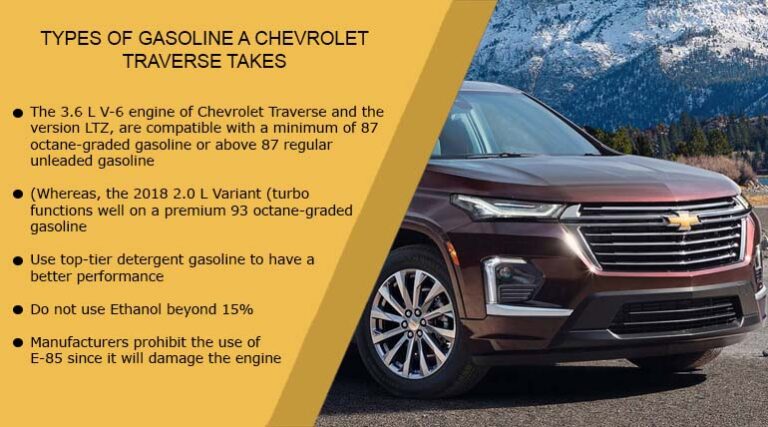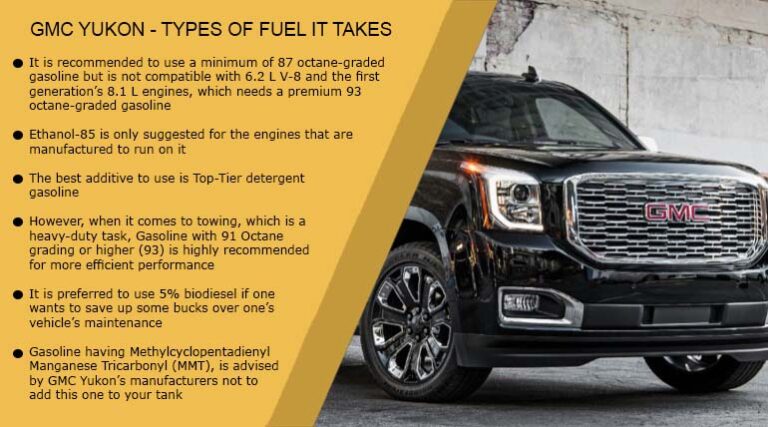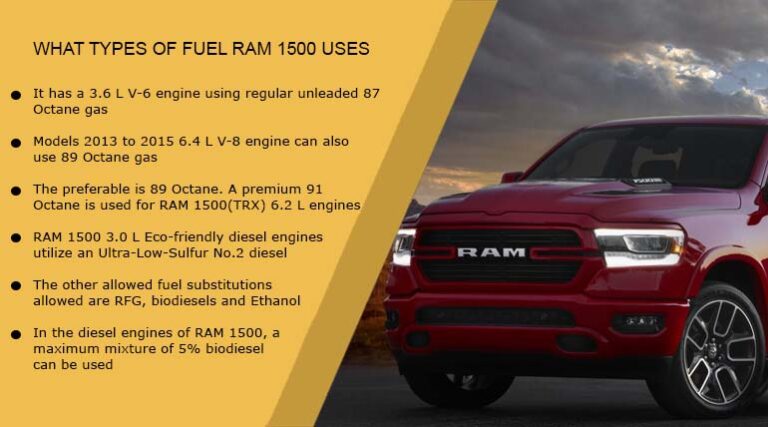What Types of Fuel A Toyota Tundra Takes For All Model Years?
This piece will cover all you want to know about the exact types of fuel Toyota Tundra takes. Which one should you use?
Toyota Tundra, a unique and luxurious full-sized pick-up truck that captivates hearts, has been marketed and introduced by Toyota since 1999. Toyota Tundra has an attractive interior, safety rating, and features it offers to its drivers. It was exclusively manufactured at Toyota Motors Manufacturing, located in Indiana. It had its first model year in 2000, with its first sale in June 2000.
Let’s move further to dig in more regarding the correct types of fuel Toyota Tundra requires to perform efficiently.
An Overview!
Let’s go through the critical points of this article regarding the correct types of fuel for a Toyota Tundra before jumping into the details;
According to the manufacturers of the Toyota Tundra and all the other professional and local mechanics, mechanical engineers, and auto-mobile experts, it is recommended to use a minimum of 87 octane-graded gasoline (Regular, unleaded) for all the models of the Toyota Tundra. It can function well on gasoline of greater than 87 octanes but will perform poorly on gasoline with an octane rating lower than 87. Toyota recommends utilizing RFG for its engines, such as 4.6 L and 5.7 L. It is recommended to use Ethanolnot greater than 15% for Toyota Tundra or should be lower than 15%.
Types of Fuel All Models of Toyota Tundra Require
All the information here concerning the correct types of fuel for your Toyota Tundra has been well explored to assist you, so that you can enjoy fully out of your Tundra while keeping your engine safe from damage.
Also read: Toyota RAV4 – Types of Fuel It Takes
Significance of Opting for the Correct Type of Fuel for Toyota Tundra
So, why is it important to know about the correct type of fuel for your Toyota Tundra? The answer to this is quite simple; to guard your engine against damage and keep your warranty from being void.
Requirements of Fuel Based on Toyota Tundra’s Engine Type
Based on your Toyota Tundra’s engine, the correct type of fuel is opted for. Below are details regarding the engines offered by the Toyota Tundra’s all model years and the compatible fuel accordingly.
The Toyota Tundra – Model Year 2000 to 2006
Toyota Tundra model years 2000 to 2006 include the following engines;
- 4 L V-8 with 270 Horse Power (HP)
- 4.7 L V-8 (pick-up)
A minimum of 87 octane-graded gasoline (Regular, unleaded) is recommended for the engines 4 L V-6 and 4.7 L V-8 to function and perform optimally. Utilizing gasoline with more than an 87-octane rating will not have any effect on the performance of the engine. Consuming gasoline with an octane grading of less than 87 will harm your engine.
The Toyota Tundra – Model Year 2007 to 2013
Toyota Tundra model years 2007 to 2013 include the following three engines;
- 4.0 L V-6 with 270 Horse Power (HP)
- 4.6 L V-8 with 310 Horse Power (HP)
- 5.7 L V-8 with 381 Horse Power (HP)
A minimum of 87 octane-graded gasoline (Regular, unleaded) is recommended for the engines 4.0 L V-6, 4.6 L V-8, and 5.7 L V-8 to function and perform optimally.
The Toyota Tundra – Model Year 2014 to 2018
Toyota Tundra model years 2014 to 2018 include the following two engines;
- 4.6 L V-8 with 310 Horse Power (HP)
- 5.7 L V-8 with 381 Horse Power (HP)
A minimum of 87 octane-graded gasoline (Regular, unleaded) is recommended for the engines 4.6 L V-8 and 5.7 L V-8 to function and have optimum performance.
The Toyota Tundra – Model Year 2018 to 2022
Toyota Tundra model years 2018 to 2022 include the following engines;
- 5.7 L V-8 with 381 Horse Power (HP)
A minimum of 87 octane-graded gasoline (Regular, unleaded) is recommended for the engine 5.7 L V-8 to function and perform optimally. Toyota Tacoma consumes similar gasoline type: Click here to read more.
The Toyota Tundra – Model Year 2023
For the latest Toyota Tundra model year 2023, it is recommended to use a minimum of 87 octane-graded gasoline (Regular, unleaded). Gasoline with added cleaning agents such as detergents is encouraged to be used, such as; a top-tier detergent gas.
Other Varieties of Fuel; Are They Compatible with Toyota Tundra?
Which Varieties Of Fuel Should Be Used And Are Compatible With Toyota Tundra? Today, we have a variety of fuel options for our automobiles. From Reformulated Fuel (RFG) to different additives and blends.
But does Toyota suggest any of these for its Toyota Tundra total models and generations? Let’s read further to find it out.
Toyota’s Suggested Additives and Fuel for its Toyota Tundra
It has been emphasized to consume top-tier detergent gasoline for Toyota Tundra, which keeps the engines clean and away from debris. A minimum of 87 octane-graded gasoline (Regular, unleaded) is recommended for all of its generations. It is always crucial to consider your vehicle’s manual properly before opting for a type of fuel and its compatibility with your Toyota Tundra’s all models.
Reformulated Gasoline Fuel (RFG)
With a nature-friendly impact and for cleaner and greener burning, Reformulated Gasoline (RFG) is produced, which causes decreased smog and less toxic pollutants than regular gasoline, having no negative impacts. It is said to increase the miles per gas number of your vehicle. It is also best recommended for the area having smog at a higher concentration to decrease air pollution. RFG can be used with your Toyota Tundra, whenever available, by Toyota manufacturers. These fuels eliminate the effects of Volatile Organic Compounds, Carbon Mono-Oxide, and oxides of Nitrogen. It is recommended by Toyota to utilize RFG for its engines, such as 4.6 L and 5.7 L.
Want to read more on Toyota? Read: Types Of Fuel A Toyota Sienna Takes – Everything You Must Know!
Gasoline having Methylcyclopentadienyl Manganese Tricarbonyl (MMT)
Gasoline having Methylcyclopentadienyl Manganese Tricarbonyl, abbreviated as MMT, was used to improve the octane of fuel with poor quality. It was also used to seize the knocking noise produced by engines back then. It is suggested by the manufacturers of the Toyota Tundra not to add this one to your tank since the presence of the metal Manganese in this additive can damage the system of your vehicle that controls the emissions as well as the life of spark plugs.
E-85 or Gasoline/Oxygenated Blends
It is recommended to use Ethanol not greater than 15% for Toyota Tundra or should be lower than 15%. Ethanol is a term for an anti-knock and a substance used to enhance octane. It may lower the vehicle’s mpg but tend to increase the horsepower and number of torques.
If your Toyota Tundra is a flex-fuel, it is compatible with Ethanol-85 (E-85). Toyota does not recommend using E-85, even if the vehicle is a flex-fuel.
Gas with Added Materials
To keep your engine clean, safe, and up to the standards of emission, TOP-TIER detergent gasoline is highly recommended for the Toyota Tundra. It is suggested by Toyota to utilize a gas mixed with a large concentration of agents used for cleaning. These are readily available with your nearest top-tier retailers. Additives prohibited from being used include methanol, silicon, and any metal-based ones.
The Most Repeatedly Asked Questions About Toyota Tundra!
What If My Engine Knocks Afterwards Refilling?- A “Knocking-Noise” After Refueling! What Does It Indicate?
If lower octane-rated gasoline is used in your Toyota Tundra, it degrades the performance and economy of the engine. Gasoline will burn prematurely if a lower octane gas is put in an engine with higher compression, causing an unsmooth burn and engine knock. Hence, using the correct gasoline fuel with accurate octane grading is crucial.
If a fainted-knocking sound is heard from the engine, it indicates no danger. But if a loud knocking sound is heard, it is due to using lower quality and lower octane-rated gasoline.
How to Reduce “Knocking Noise”?
To reduce the knocking-like noise in your Toyota Tundra, it is recommended to fill up your tank with a recommended minimum of 87 to 89 Octane-graded gasoline (never lesser than 87) or a premium 91-octane gasoline or greater.
How to Locate a Flex-Fuel Vehicle?
A yellow bezel surrounding the inlet of the fuel tank indicates that your vehicle is flex-fuel. If you cannot find it there, you can check out the door of your fuel tank as well.
If your Toyota Tundra has a Flex-Fuel emblem and a yellow gas tank cap, it signifies it is E-85 compliant and safe to utilize E-85 Fuel. But Toyota does not recommend using E-85, even if the vehicle is a flex-fuel.
But keep in mind to burn all the flex-fuel when you run your vehicle on regular gas, and don’t add less than 3 gallons of flex-fuel in your tank while refilling.
Related article: Types Of Gasoline A Toyota Corolla Takes (Explained)
OWNERS’ REVIEWS – TOYOTA TUNDRA – Regular, Mid-Grade, or Premium Gasoline, Which One Shows the Best Performance?
After conducting revisions from numerous forums, and reviews of the people around the globe using Toyota Tundra, it has been found that; using a regular, unleaded gasoline with 87 Octane-rating has proved to work well for them, the ones using the gas with 91 or higher Octane rating has proved to work much better for them. Hence, regular and mid-graded can be used. Many have suggested not consuming Ethanol specifically for older models.
It has been declared by many experienced Toyota Tundra drivers that going on a gas lesser than 87-octane abuses the engine and its performance.
Conclusion
To conclude, use a minimum of 87 octane-graded gasoline (Regular, unleaded) for all the models of the Toyota Tundra. It can function well on gasoline of greater than 87 octanes but will perform poorly on gasoline with an octane rating lower than 87.
RFG can be used with your Toyota Tundra, whenever available, by Toyota manufacturers. These fuels eliminate the effects of Volatile Organic Compounds, Carbon Mono-Oxide, and oxides of Nitrogen. It is recommended by Toyota to utilize RFG for its engines, such as 4.6 L and 5.7 L.







